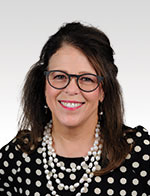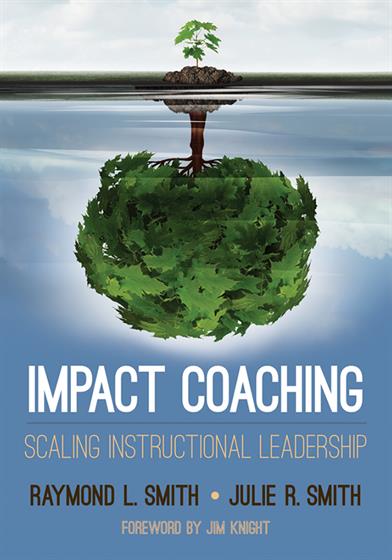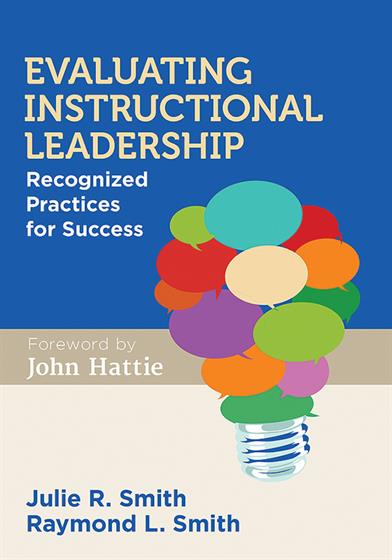
Julie R. Smith
Dr. Julie R. Smith is a thirty-five year veteran educator, speaker, consultant, and author. Her passion, area of focus, and expertise is in building leadership capacity within people and systems; school improvement planning, and teacher, principal, and district evaluation models. Dr. Smith continues her learning by providing workshops in North America and Canada around Professor John Hattie’s research in Visible Learning as a Visible LearningPlus Consultant with Corwin. She is also trained to provide workshops in Dr. James Popham’s research around designing and implementing defensible teacher evaluation programs and Dr. Russ Quaglia’s Student Voice and Aspiration Framework. She most recently co-authored Evaluating Instructional Leadership: Recognized Practices For Success (2015).
Expertise
- Teacher Evaluation
- Instructional Leadership
Workshops
Workshops
-
Instructional Leadership: This highly interactive custom seminar for school/district leaders is designed to help them learn how to apply high-effect size, research based leadership strategies to directly impact instruction.
-
Recognized Practice 1 Workshop—Coaching Instructional Leadership: Leaders maintain a capacity for learning and growing throughout their careers. However, experience alone is insufficient to promote continuous learning. Growth occurs when leaders reflect on that experience and use meta-cognitive processes that allow them to exercise active control over the cognitive processes engaged in learning. District and school leaders will learn how to support school leaders in assessing and improving their instructional leadership practices—their Big Five Winner Practices that have the greatest impact on learning and student achievement. By engaging in rich, rigorous, and reflective open-to-learning conversations with a coach and with colleagues, leaders can continue to develop and grow as they construct meaning, reinvest their cognitive resources, and apply new learning in order to improve results.
-
Recognized Practice 2 Workshop—Feedback for Teacher & Leader Learning: Leaders learn how to apply Professor John Hattie’s Visible Learning research focusing on the power of formative evaluation and effective feedback to leaders’ teacher observation and classroom walkthrough practices. Specifically, this one-day seminar will address the following issues:
- What does the research reveal about feedback? What constitutes effective feedback?
- What is a key aspect of the architecture of an effective feedback model?
- What kind of culture breeds effective feedback?
- What is the relationship between feedback and assessment-capable learners—teachers and school leaders?
- What are your next steps?
Providing both teachers and leaders formative evaluation feedback on the impact they are—or aren’t having increases student achievement. Why is formative evaluation so powerful? Because organizations that provide effective feedback to teachers and leaders tend to have a culture focused on improvement, a willingness to seek evidence of their impact, and openness to powerful new ideas and strategies.
-
Recognized Practice 3 Workshop—Engaging in Linking Walks: District and school leaders will discover how to implement the Linking Walk process (i.e., organized small group classroom observation process) to deepen collective understandings of instructional practices related to continuous school and district improvement efforts. Specifically, they will learn how to use data gathering tools to:
- Collect system-wide data around a Problem of Practice aligned with district and school improvement priorities and linked to the client’s teacher and school leader evaluation framework;
- Identify trends and patterns in instructional and leadership practice and student learning;
- Perpetuate ongoing collegial dialogue about the impact of quality teaching and leadership;
- Learn from peers their observations, inquiry, and perspectives;
- Deepen collective understanding about specific Problems of Practice and theories of action; and,
- Deepen collective understandings and practices related to continuous school and district improvement efforts.
Skilled leadership is needed to help teachers and school leaders link their accounts of their own teaching and leading (e.g., practices being implemented, resources being used, activities planned, etc.) to its actual or possible impact on particular students. Similarly, skilled leadership is needed to guide teachers and school leaders to link their discussion of students (home background, behavior in class, engagement with learning intentions) with features of the classroom and school environment and their own teaching and leading.
-
Recognized Practice 4 Workshop—What’s Changed About Change Leadership?: Changing institutions is hard for many reasons, but just to get a sense of the challenge, it is worth rehearsing some of the main ones. For instance,
- Institutions have ingrained patterns of belief and behavior that are widely accepted as normal or natural no matter how poorly they work
- Institutions may be embedded in intricate systems of laws and regulations as well as competing values that make change difficult. A desire to move things in one direction
- Institutions have established interest groups and powerful individuals who seek to preserve their own situations and benefits even when doing so does not serve the institution’s goals
- Parents and students may be particularly reluctant to change some of the long-standing features of schools even when these features do not benefit them.
- People may not know how to do the new things that are asked of them
- Institutional longevity or popularity many not necessarily be related to good outcomes for students.
This one day professional development session is designed to help school and district leaders become familiar with and conversant in a variety of contemporary change leader concepts and their different points of view, demonstrate the ability to paraphrase key aspects of the research on change leadership, and apply new learning by creating a rough draft of a change plan using the content learned from this presentation.
-
Recognized Practice 5 Workshop—Linking Practice to Impact/Deliberate Practice: In the Visible Learning research (Hattie, 2009), Professor John Hattie argues that the underlying powerful impacts in our schools relate to the notion that great accomplishment by anyone (students, teachers, leaders) are not just a byproduct of innate talent. Great achievements are linked to years of development and steady preparation, which often take place in highly supportive contexts. Such findings give support to the concept of deliberate practice. The key behind deliberate practice within this seminar is devoting time to improving the leadership skill, not just practicing the skill. To that end, it is driven by the development of complex goals and supervised by a series of coaches or peers who emphasize the relationship between leadership actions and the results of those actions. When educators become the evaluators of their impact, they establish the basis for the greatest single improvement in their school. District and school leaders will learn how to develop and implement a Deliberate Practice Plan (personal leadership growth plan) that will have a significant impact on adult and student performance in a school context.
-
Recognized Practice 6 Workshop—Activating Linking Talks with and Among Teachers: One of the primary functions of school leaders is instructional leadership – it is ensuring that there is a collective collaboration of all the adults in the school to have an agreed understanding of what impact means in the school. District and school leaders will learn strategies to help orchestrate dialogue with and among teachers about their impact on student learning so they know what impact looks like and how it can be evaluated in the school in order to improve student engagement and achievement.
-
Recognized Practice 7 Workshop—High-impact Leadership Practices: Effective school leaders must leverage their big winner leadership practices. To help describe the concept of identifying and leveraging big winner leadership practices we will draw on a principle taken from the field of total quality management. Let’s apply the Pareto Principle—what’s known as the “80/20 rule”—to your leadership practices. The “80/20 rule” argument goes something like this: Roughly 80 percent of your leadership impact will come from 20 percent of your leadership practices. Another way of saying this is that a significant few leadership practices will account for most of your leadership impact. The biggest part of your leadership practices—say approximately 80 percent—will be so much less impactful that they will produce only 20 percent of your effect on learning and student achievement.
Over this two-day seminar (Note: Day 1 is followed by Day 2 30-45 days later) district and school leaders will be engaged in reflective practice, self-assessments, and interactive learning activities designed to help leaders understand how they can prioritize their time on high-yield instructional leadership practices to bring about significant gains in student achievement. Specifically, leaders will focus on the organizational side of their responsibilities and discuss how best to manage their time and use it effectively. Toward that end, school leaders will be engaged in reflective practice, self-assessments, and a variety of interactive learning activities that are designed to help leaders get to their most important work of promoting and participating in the professional learning and development of their teachers and providing and securing feedback from their teachers information about their instructional ability to bring about significant gains in student achievement.
-
Recognized Practice 8 Workshop—Developing An Instructional Leadership Evaluation Framework: While the research on principal leadership in general has developed into a growing body of thick scholarship, the research on principal-evaluation systems remains surprisingly thin. This is concerning given the fact that nearly 60% of a school’s total impact on student achievement is attributable to effective teacher and principal practices (Seashore-Louis et al., 2010), with the impact of leadership alone being described by some as the single most important factor in moving schools forward (Fullan, 2010a). Moreover, research has determined that many principal evaluation instruments
- Distract attention away from those leadership practices that are closely linked to increases in student achievement and teacher performance;
- They tend not to focus on the leadership practices that matter the most;
- They are generally populated with vague and unclear performance expectations that do not allow evaluators to effectively measure leadership performance;
- They tend to incorporate limited sources of evidence be used to evaluate a principal;
- If they weight evidence sources they apply a “one size fits all” approach, which means they fail to individualize the evidence sources to the particular principal’s school level, context, and level of experience; and,
- Growth plans are viewed as a consequence of poor leadership performance rather than natural byproducts of principal-evaluation systems and are useful tools for continuous improvement for all principals, regardless of their prior level of leadership performance.
Certified In
- Visible LearningPlus
- Student Voice
- Corwin Teacher Evaluation
Books
This is a carousel with book cards. Use the previous and next buttons to navigate.


